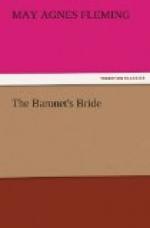“And you refuse to tell me?”
“Everard, I have sworn!” she cried out, wildly. “Would you have me break a death-bed oath?”
“I would have you break ten thousand such oaths,” he exclaimed, “when they stand between you and your husband! Harriet Hunsden, your dead father was a villain!”
She sprung to her feet—she had been kneeling all this time—and confronted him like a Saxon pythoness. Her great gray eyes actually flashed fire.
“Go!” she cried. “Leave me this instant! Were you ten times my husband, you should never insult the memory of the best, the noblest, the most devoted of fathers! I will never forgive you the words you have spoken until my dying day!”
“You forgive!” he retorted, with sneering scorn, stung out of all generosity. “Forgiveness is no word for such lips as yours, Lady Kingsland! Keep your guilty secret, or your father’s or your mother’s, whosoever it may be; but not as my wife! No, madame! when the world begins to point the finger of scorn, through her own evil-doing, at the woman I have married, then from that hour she is no longer my wife. The law of divorce shall free you and your secrets together; but until that freedom comes, I command you to meet this man no more! On your peril you write to him, or speak to him, or meet him again. If you do, by the living Lord, I will murder you both!”
He dashed out of the room like a man gone mad, leaving her standing petrified in the middle of the floor.
One instant she stood, the room heaving, the walls rocking around her; then, with a low, moaning cry, she tottered blindly forward and fell like a stone to the floor.
The storm burst at midnight. A gale surged through the trees with a noise like thunder; the rain fell in torrents. And while rain and wind beat tempestuously over the earth and the roaring sea, the husband paced up and down the library, with clinched teeth and locked hands and death-like face—for the time utterly mad—and the wife lay alone in her luxuriant room, deaf and blind to the tempest, in a deep swoon.
CHAPTER XXVI.
“THE PERSON IN LONDON.”
The February day was closing in London in a thick, clammy, yellow fog. No keen frost, no sparkling stars brightened the chill spring twilight; the sky, where it could be seen, was of a uniform leaden tint, the damp mist wet you to the bone, and a long, lamentable blast whistled around the corners and pierced chillingly through the thickest wraps, and passengers strode through the greasy black mud with surly faces and great-coats and the inevitable London umbrella.
At the window of a dull and dirty little lodging a woman sat, in this dark gloaming, gazing out at the passers-by. The house had a perpetual odor of onions and cabbage and dinner, as it is in the nature of such houses to have, and the room, “first floor front,” was in the last stage of lodging-house shabbiness and discomfort.




